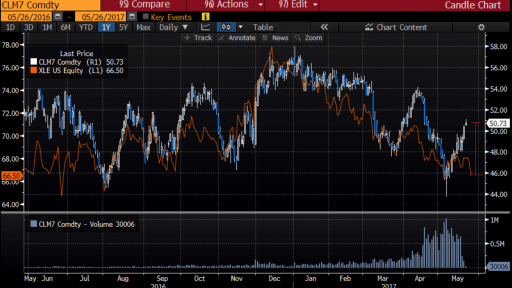- Home
- >
- Stocks Daily Forecasts
- >
- Here is why is good moment to invest in energy sector

Here is why is good moment to invest in energy sector

The Organization of the Petroleum Exporting Countries’ (OPEC) extension of production cuts is good news for energy-stock bulls, even though oil is tanking Thursday.
Some traders and investors were expecting a longer time frame or larger cuts. But, still, lower production will eventually lead to higher prices — supply and demand.
But the possibility of higher prices in the months ahead isn’t the real reason you should be bulking up on energy shares.
Here are the six reasons why the purchase of energy stocks is currently a good investment
1: Oil stocks have fallen a lot, but oil has not
Energy stocks are the worst-performing group this year. The Energy Select Sector SPDR exchange traded fund XLE, -1.82% is down 10%, compared with a 7.4% gain for the S&P 500 Index SPX, +0.44% But this isn’t even the most interesting divergence.
Instead, that distinction goes to the gap between energy stock and oil. Energy stocks have tanked, but oil today trades where it did at the start of the year.
2: Global petroleum inventories are declining
The last time OPEC agreed to curtail production, in late 2016, it delayed the start date until Jan. 1.
“So a lot of countries overproduced in November and December,” says Mike Breard, an energy analyst at Hodges Capital Management. That flooded the world with crude oil, a lot of which wound up in U.S. inventories. The U.S. is the go-to market for sellers, in part because storage is cheaper.
3: Service companies want more money
After years of making concessions to customers, energy-services companies are starting to raise prices.
“We are seeing signs of cost inflation.
Energy analysts at Barclays expect average cost inflation of 10% for 2017. This will limit production growth. And that supports higher oil prices.
4: Energy production is in a constant state of natural decline
The only thing in the oil industry that never stops, is exhaustion. If the consumption of petroleum products remains at the same level, then the needs of consumers will be in difficulty. For this reason, we can observe a gradual increase in the price of oil.
5: Big oil has under-investment in big projects
In response to the sharp oil-price decline during 2014-2016, major producers and big national oil companies around the world cut back investments in long-term projects in 2015 and 2016. That’s unusual.
This in turn will force them to use outdated extraction technologies that will not be cost-effective in the long run and will require more extraction. This, of course, will affect the final cost of the raw material.
6: Geopolitical instability threatens supply
Major oil producers face problems at home that could disrupt supply at any moment. Venezuela is in turmoil because of protests against the government. Nigerian supply regularly gets disrupted by anti-government protestors. In Libya, production is either inconsistent or threatened by ISIS.
Saudi Arabia, the second-biggest oil producer after the U.S., needs high energy prices to fund government-benefits programs and jobs, which help keep the peace. Saudi Arabia is in a bind, which supports the outlook for higher oil prices. Saudi Arabia is at or near maximum production. This means if oil prices decline sharply, it has little room to increase production to boost revenue. This gives it a big incentive to favor higher prices.
Here are 16 companies that can take advantage of the situation:
- Continental Resources inc (NYSE: CLR)
- Occidental Petroleum Corp. (NYSE: OXY)
- Helmerich % Payne Inc. (NYSE: HP)
- Nabors Industries Ltd. (NYSE: NBR)
- Dominion Energy Inc. (NYSE: D)
- Ness Corp (NYSE: HES)
- Matador Resources (NYSE: MTDR)
- Oasis Petroleum Inc. (NYSE: OAS)
- Murphy Oil Corp. (NYSE: MUR)
- Spark Energy (NYSE: SPKE)
- Carrizo Oil and Gas Inc (NYSE: CRZO)
- SM Energy Co (NYSE: SM)
- Parsley energy inc (NYSE: PE)
- Energy XXI Gulf Coast Inc (NYSE: EXXI)
- Chesapeake Energy Corp (NYSE: CHK)
- Superior Energy Services Inc (NYSE: SPN)
Source: Bloomberg Pro Terminal
Jr Trader Petar Milanov
 Varchev Traders
Varchev Traders Read more:
If you think, we can improve that section,
please comment. Your oppinion is imortant for us.











